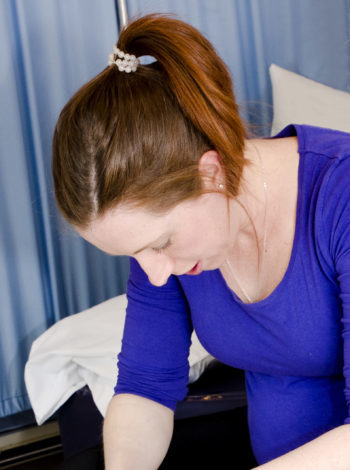Many pregnant women (but not all) experience nausea and sometimes vomiting in the first trimester of pregnancy (first twelve weeks). This is believed to be due to changes in hormonal levels in pregnancy. It is often referred to as morning sickness as many women feel worse in the morning, however nausea and vomiting can occur at any time of the day, and some women continue to have these symptoms after the first twelve weeks.
Occasionally women experience nausea and vomiting throughout the whole of their pregnancy which can be very distressing. It is important to talk to your midwife about how you are feeling. Experiencing nausea and vomiting in one pregnancy does not necessarily mean you will suffer the same symptoms in subsequent pregnancies.
Symptoms usually begin 4–6 weeks after your last period and peak between 9 and 16 weeks.
Symptoms can occur at any time of the day and often include:
- nausea
- vomiting
- dry retching
- reflux of acid into the throat
- food smell or sight sensitivity (certain smells or the sight of some foods can trigger nausea). This means that cooking or even opening the refrigerator can cause nausea.
The exact cause is unclear, but the symptoms are thought to be due to a combination of factors such as:
- physical, hormonal and chemical changes that pregnancy triggers particularly in relation to the hormones human chorionic gonadotrophin (HCG), progesterone and oestrogen.
- fluctuations in blood pressure particularly lower blood pressure which can occur in early pregnancy
- altered metabolism of carbohydrates which can cause episodes of low blood sugar
Morning sickness may be more likely to happen:
- when you have an empty stomach/hungry
- if you are stressed and/or tired
- if you experience strong smells.
What may help you manage morning sickness?
Getting adequate rest, drinking plenty of fluids and eating small meals several times a day may help. Fresh air and gentle activity may also help.
Food
- Try to avoid becoming overly hungry and eating 5 to 6 small meals a day can help.
- Try eating a bland, protein-rich diet.
- Have something to eat before getting out of bed in the morning (toast, cracker).
- Avoid foods that are fatty or make you feel nauseous.
Fluids and keeping hydrated
- Keep yourself well hydrated.
- If you find it difficult to drink water, try sucking on crushed ice or ice blocks.
- Many women find icy cold fluids easier to tolerate.
- Small frequent sips of water, between meals, are easier to keep down.
- You can also keep yourself hydrated by drinking soups, smoothies and shakes.
Exercise
- Keep active – regular, gentle exercise helps.
- Getting fresh air may help you feel better. Take a short walk, turn on a fan, or try to sleep with the window open. When you are cooking, open windows to get rid of smells that may cause nausea.
- Do not smoke cigarettes. Ask other people not to smoke around you.
Rest
- Get enough sleep, take rests if needed and avoid getting overtired.
- Don’t try to maintain the same schedule or level of activity as you did before your pregnancy.
- Avoid stress and try stress-reduction techniques, like meditation.
Brushing your teeth
- Delay brushing your teeth in the morning if you find it makes you retch or vomit. Instead, wait to brush until your stomach feels more settled.
- Also, wait about half an hour after eating to brush your teeth.
Many remedies have been tried by pregnant women looking for relief from morning sickness including:
- Acupressure: try sea-sickness acupressure bracelets
- acupuncture
- ginger – taken as ginger tea, ginger ale, ginger-containing foods or ginger capsules
- chamomile
- peppermint
- vitamin B6
A Cochrane Systematic Review of the evidence in 2015 identified that “there is a lack of high‐quality evidence to support any particular intervention. This is not the same as saying that the interventions studied are ineffective, but that there is insufficient strong evidence for any one intervention” (Matthews, 2015).
Many women will try a number of approaches until they find one that helps them. For some women nothing seems to help and they may need to discuss the pros and cons of medication with their midwife or GP. Medication may be required where vomiting is severe and affecting your physical and psychological well-being. Vomiting to this degree is called hyperemesis gravidarum – excessive vomiting of pregnancy.
Hyperemesis
If nausea and vomiting become prolonged or severe this may be a sign of hyperemesis.
The full name for this condition is hyperemesis gravidarum and it affects approximately 1.1% of pregnant women. Because the persistent vomiting is severe it can lead to further health conditions such as dehydration, issues with nutrition and weight loss. These physical effects may be severe enough to stop pregnant women from continuing in the workforce and support may be required for the mother to take care of other children in the family. Enjoyment of eating is likely to be affected, and sometimes certain cooking or cleaning aromas are also difficult to tolerate. Bowels may also be affected, and constipation can become an issue, which may lead to haemorrhoids and anal fissures. The pregnant woman’s mental health may also be understandably affected. Managing hyperemesis can include methods such as diet modifications, medical interventions such as medications to stop the vomiting, intravenous fluids if dehydration becomes serious and gastric acid reflux and constipation treatment, along with support in the home to manage everyday tasks. Some complementary therapies such as ginger and vitamin B6 have shown benefit but evidence is limited, and it is important to discuss options with the midwife particularly if there is already a clinical treatment plan in place. The midwife can provide resources and information about how to manage hyperemesis and refer to other services such as dietitians.
Resources and support can be found at:
Hyperemesis Gravidarum Advocacy New Zealand https://hgadvocacy.org.nz/
Facebook – Hyperemesis Peer Support NZ https://www.facebook.com/groups/885735235288936
